Young Female Scientist Excels in International Arena CUHK Professor Rossa Chiu Scoops Two Research Awards
Prof. Rossa Chiu of the Department of Chemical Pathology at The Chinese University of Hong Kong (CUHK) recently reaped two international research awards—the 2011 International Federation of Clinical Chemistry and Laboratory Medicine (IFCC) Young Investigator Award and the 2011 Professors' Prize endowed by the Association of Academic Heads of Clinical Biochemistry Departments in the UK. There was keen competition for both awards as only one recipient was selected for each from around the world. Professor Chiu is the second CUHK scholar, following Prof. Dennis Lo Yuk-ming, Director of the Li Ka Shing Institute of Health Sciences at CUHK, to have won the Professors' Prize from the Association of Academic Heads of Clinical Biochemistry Departments in the UK; she is also the world's first scientist to have been conferred the IFCC Young Investigator Award. Professor Chiu's laurels have once again spoken for CUHK's research strengths and reaffirmed the University's leading position in innovative research.

From left: Mr. Graham Beastall, IFCC President; Mr. Joseph Pasarelli, Roche Diagnostics (sponsor for the award); Prof. Rossa Chiu; Prof. Dennis Lo; Prof. Christopher Lam (former chairman of Chemical Pathology, CUHK)
Professor Chiu said, 'I'm deeply honoured to receive both awards. I shall continue to work towards the goal of making non-invasive prenatal diagnosis a common practice worldwide.'
Inspired and supported by Prof. Dennis Lo Yuk-ming, recently elected as a fellow of the Royal Society of the United Kingdom, Professor Chiu has dedicated herself to research on clinical applications of non-invasive prenatal diagnosis, including analysing fetal DNA in maternal plasma for prenatal diagnosis of diseases, including Down syndrome and beta-thalassaemia. She was the lead author of the first international large-scale study that used the latest DNA sequencing technology to analyse millions of DNA fragments from each maternal blood sample for non-invasive prenatal diagnosis of Down syndrome. Compared with current invasive procedures that carry about 1% chance of miscarriage, the DNA sequencing technology is safe and has achieved 100% sensitivity and 98% specificity. The international study collected over 750 blood samples from high-risk pregnant women in Hong Kong, the UK and the Netherlands, with 86 samples from pregnancies with Down syndrome fetuses. According to the findings, DNA blood test can identify all cases of Down syndrome and confirm all 98% unaffected cases remaining. The study is the largest-scale clinical research using DNA sequencing technology as a diagnostic tool, and its findings were published in the premier British Medical Journal in January this year with extensive media coverage around the world.
In 1997, Professor Lo discovered that during pregnancy, the baby would release its DNA into the mother's blood plasma, unveiling possibilities for non-invasive prenatal diagnosis. Professor Chiu joined Professor Lo's research team in 1999 and contributed to the development of a number of prenatal diagnostic tests. In 2010, the team attained another groundbreaking achievement by deciphering the genomic map of the fetus using maternal blood. The recent large-scale study conducted by Professor Chiu translates such scientific discoveries into clinical tests that would benefit pregnant women all over the world. Professor Chiu said, 'The availability of the non-invasive DNA blood test can greatly reduce the psychological stress of many couples who may otherwise need to go through the potentially risky procedures of Down syndrome diagnosis, like amniocentesis.'

Prof. Gordon Ferns, Secretary of the Assocation of Academic Heads of Clinical Biochemistry in the UK, and Prof. Rossa Chiu
IFCC is a leading global organization in the field of clinical chemistry and laboratory medicine that strives to enhance the scientific level and quality of diagnosis and therapy for patients worldwide. The Young Investigator Award, offered in its first year and will be given out triennially, aims at recognizing and encouraging the academic and professional development of a young investigator aged under 40 for his/her scientific achievements in the fields of clinical chemistry and laboratory medicine. Endowed by the Professors and Heads of Academic Clinical Biochemistry Departments in the UK for original research in medical sciences, awardees of the Professors' Prize are selected from researchers from the world for their substantial and sustained contributions to research in clinical biochemistry in their early career. Professor Chiu received these two awards respectively in the opening ceremony of the 21st IFCC International Congress in Clinical Chemistry and Laboratory Medicine held in Berlin, Germany, and at the annual meeting of the Association of Clinical Biochemistry Departments held in Harrogate of the UK earlier.
Professor Chiu graduated from the University of Queensland, Australia, in 1997 with First Class Honours in Bachelor of Medicine and Bachelor of Surgery. In 1999, she joined the Department of Chemical Pathology, CUHK, where she received specialist training in chemical pathology and attained a PhD degree in 2004 under the supervision of Prof. Dennis Lo. During the period 2004–05, Professor Chiu became a fellow of the Royal College of Pathologists of Australia, a fellow of the Hong Kong College of Pathologists and a fellow of the Hong Kong Academy of Medicine (Pathology). Professor Chiu served as the president of the Hong Kong Society of Clinical Chemistry in 2003–04, and is currently a Professor in CUHK and an Honorary Consultant of Chemical Pathology at the Prince of Wales Hospital. Further to her research achievements, Professor Chiu also excels in teaching. She won the annual Teaching Award from the Faculty of Medicine for five consecutive years from 1999 and was finally awarded the title of Master Teacher by the Faculty of Medicine at CUHK in 2005 (for recipients of five Teaching Awards).

Prof. Rossa Chiu shows the sequencing slide.

A group photo of Prof. Rossa Chiu (1st left, 1st row) with her research team.




















